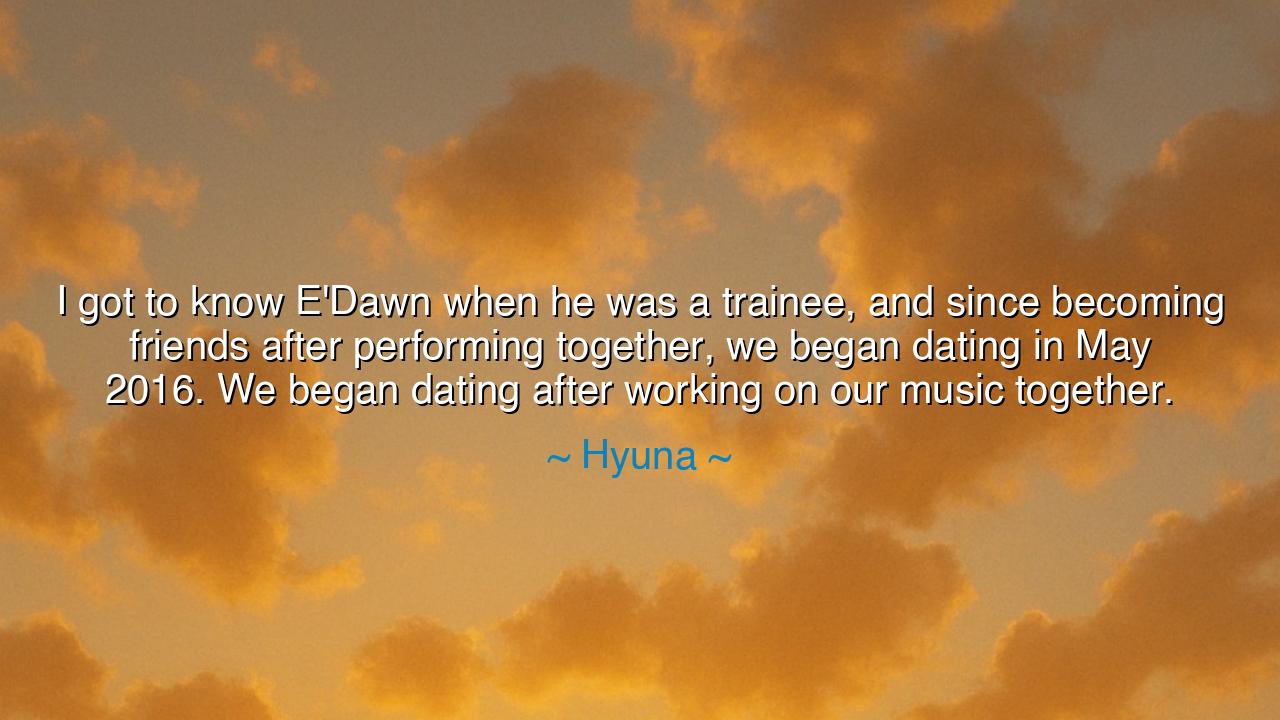
I got to know E'Dawn when he was a trainee, and since becoming
I got to know E'Dawn when he was a trainee, and since becoming friends after performing together, we began dating in May 2016. We began dating after working on our music together.






In the scroll of modern song, a tender line is etched like an oath before the altar of craft: “I got to know E’Dawn when he was a trainee, and since becoming friends after performing together, we began dating in May 2016. We began dating after working on our music together.” So speaks Hyuna, and her words carry the fragrance of rehearsal rooms and stage lights, of laughter shared over a beat that finally lands. The saying reveals an ancient rhythm beneath a contemporary story: first the work, then the friendship, then the vow the heart makes quietly to itself. It is a hymn to the way art forges kinship—and how collaboration sometimes ripens into love.
Hear the meaning behind her plain confession. In the world of stages and schedules, many bonds are quick and bright as sparks; few endure the gravity of the everyday. But friendship born from working on our music together is slower fire, the kind that tempers steel. It tests the soul: can your joy survive the metronome, the revision, the long unglamorous grind? When two artists keep time through failure and breakthrough, they learn each other’s tempos of courage and rest. Then, if dating comes, it arrives not as frenzy but as recognition—the heart saluting a comrade it already trusts.
Mark also the seedtime: trainee, performing, friends. These are the stations of a pilgrimage where titles fall away and character remains. In the training hall, humility; on the stage, bravery; in the green room, kindness. By the time May 2016 arrives, the calendar is only giving a date to what practice has already declared. Thus the origin of the bond is not gossip but labor: a melody carried together until it could carry them in return.
Set beside this a tale from an older stave of music, that the lesson might stand on two feet. Clara Wieck and Robert Schumann first met at the piano bench—trainee to master, then performers, then friends who heard in one another a courage they could trust. Their letters were as careful as their counterpoint; their dating grew where their working had already made a home. When life grew stormy, it was the discipline of their art—the shared scales, the mutual edits—that steadied the hand. The ages change their instruments, but the grammar of devotion remains: make the song together, and it may make you together.
There is a quieter wisdom, too, in the order of Hyuna’s line. She does not say the music existed to excuse the romance; she says the romance arose to honor the music’s truth. Working on our music together became a school of attention—listening without interrupting, praising without flattery, critiquing without cruelty. Such habits are the secret liturgy of durable bonds. They teach that beauty arrives when ego bows; that collaboration is the art of letting another’s strength tune your own.
What, then, shall we pass to those who hope to weave work and heart without tearing either? First, let friendship be the doorway and respect the floor. Second, write a covenant as clear as a lead sheet: how you practice, how you decide, how you rest; guard the work from drama and the love from burnout. Third, keep private altars—moments without cameras, rituals without audiences—so the bond is not devoured by its witnesses. Fourth, let the music keep the mirror: if the song begins to suffer, change the key; if the trust begins to fray, change the pace.
Take these practices as provisions for your own road. (1) Begin with a shared craft—a project that demands patience—and see who you both become under its weight. (2) Schedule listening sessions where only one speaks at a time; let the other paraphrase before replying. (3) Celebrate small performing victories with quiet gratitude, not public fireworks; build depth, not noise. (4) When dating begins, set boundaries that protect rehearsal from quarrel and the heart from overwork. (5) Rehearse forgiveness like scales; apologize early, praise often, and keep the tempo of kindness steady.
Remember, then: some loves arrive like lightning; others, like dawn. This one came by way of metronomes and microphones, a romance tuned by the patience of the studio and the courage of the stage. Trainee to friend, performer to partner, work to wonder—that is the arc. Let it be taught to the apprentices of art and tenderness alike: make something beautiful together, and in time, if grace permits, that beauty may make a second home in your hearts.






AAdministratorAdministrator
Welcome, honored guests. Please leave a comment, we will respond soon